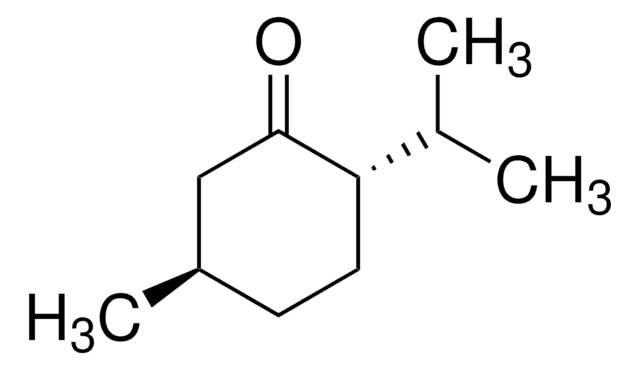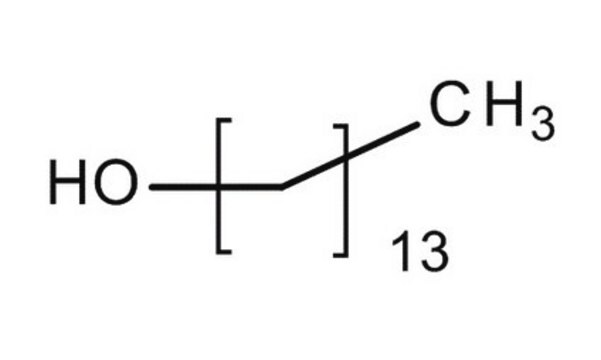All Photos(2)
About This Item
Linear Formula:
(CH3)2CH(CH2)3CH(CH3)CH2CH2OH
CAS Number:
Molecular Weight:
158.28
Beilstein:
1719638
EC Number:
MDL number:
UNSPSC Code:
12352100
PubChem Substance ID:
NACRES:
NA.22
Recommended Products
vapor density
5.4 (vs air)
vapor pressure
<0.01 mmHg ( 20 °C)
Assay
≥98%
form
liquid
refractive index
n20/D 1.436 (lit.)
bp
98-99 °C/9 mmHg (lit.)
density
0.828 g/mL at 20 °C (lit.)
SMILES string
CC(C)CCCC(C)CCO
InChI
1S/C10H22O/c1-9(2)5-4-6-10(3)7-8-11/h9-11H,4-8H2,1-3H3
InChI key
PRNCMAKCNVRZFX-UHFFFAOYSA-N
Looking for similar products? Visit Product Comparison Guide
Related Categories
General description
3,7-Dimethyl-1-octanol is an fragrance ingredient and its toxicologic and dermatologic review as a fragrance ingredient was reported.
Application
3,7-Dimethyl-1-octanol was employed as medium supplement in the anaerobic enrichment cultures of Pseudomonas citronellolis.2
Signal Word
Warning
Hazard Statements
Precautionary Statements
Hazard Classifications
Aquatic Chronic 2 - Eye Irrit. 2 - Skin Irrit. 2
Storage Class Code
10 - Combustible liquids
WGK
WGK 2
Flash Point(F)
206.6 °F - closed cup
Flash Point(C)
97 °C - closed cup
Personal Protective Equipment
dust mask type N95 (US), Eyeshields, Gloves
Choose from one of the most recent versions:
Already Own This Product?
Find documentation for the products that you have recently purchased in the Document Library.
J Harder et al.
Applied and environmental microbiology, 61(11), 3804-3808 (1995-11-01)
Anaerobic degradation of natural monoterpenes by microorganisms was evaluated by using Pseudomonas citronellolis DSM 50332 and enrichment cultures containing nitrate as an electron acceptor. P. citronellolis grew anaerobically on 3,7-dimethyl-1-octanol and citronellol but not on geraniol, nerol, and alicyclic monoterpenes.
R M Hanif et al.
Journal of controlled release : official journal of the Controlled Release Society, 55(2-3), 297-302 (1998-10-31)
Poly(acrylic acid) gels containing 5-fluorouracil (5-FU) and tetrahydrogeraniol (THG) were prepared and the effects of THG on 5-FU permeation across the excised rat skin were studied by in vitro methods. Experiments on in vitro permeation of 5-FU across the skin
R M Hanif et al.
Chemical & pharmaceutical bulletin, 46(9), 1428-1431 (1998-10-17)
The tetrahydrogeraniol (THG) derivative, ethyl-(3,7-dimethyl octyl thio) acetate (EDOTA) was prepared by reacting tetrahydrogeranyl bromide (obtained by reaction of 40% hydrobromic acid and concentrated sulfuric acid) with ethyl 2-mercaptoacetate, while 3,7-dimethyl octyl propionate (DOP) was synthesized by a common esterification
J Pevsner et al.
The Journal of biological chemistry, 265(11), 6118-6125 (1990-04-15)
We have characterized the odorant binding properties of purified bovine odorant-binding protein (OBP) using as a ligand [3H]3,7-dimethyloctan-1-ol ([3H]DMO). A broad variety of odorants, including terpenes, aldehydes, esters, and musks, bind to OBP with affinities of 0.2 to 100 microM.
A Lapczynski et al.
Food and chemical toxicology : an international journal published for the British Industrial Biological Research Association, 46 Suppl 11, S139-S141 (2008-07-22)
A toxicologic and dermatologic review of 3,7-dimethyl-1-octanol when used as a fragrance ingredient is presented.
Our team of scientists has experience in all areas of research including Life Science, Material Science, Chemical Synthesis, Chromatography, Analytical and many others.
Contact Technical Service










